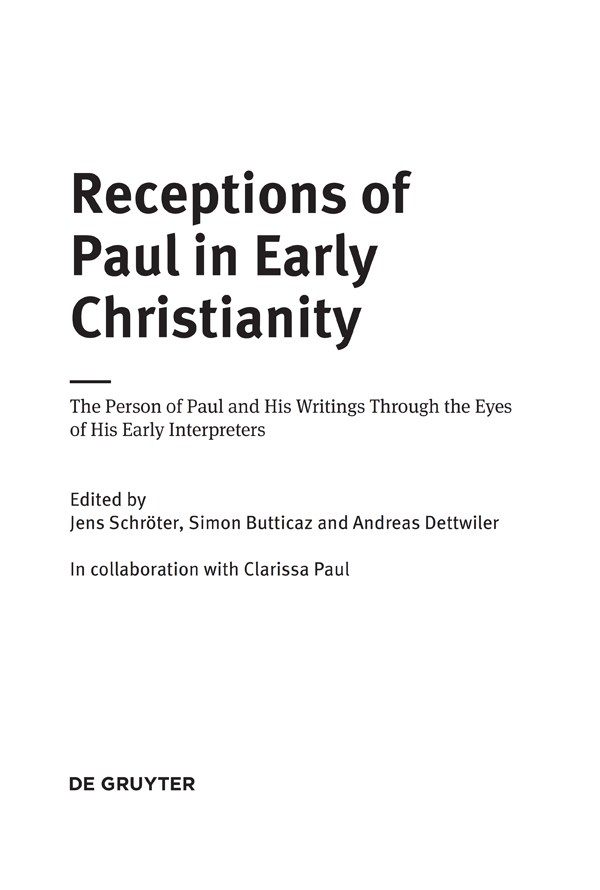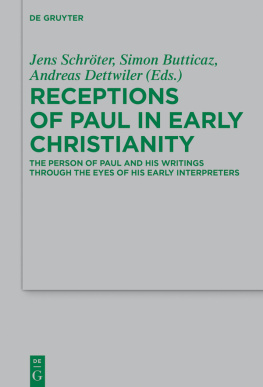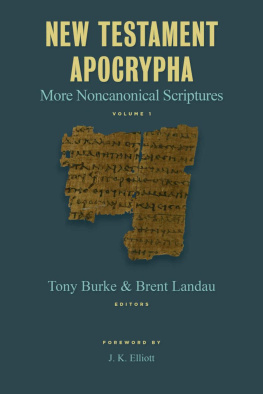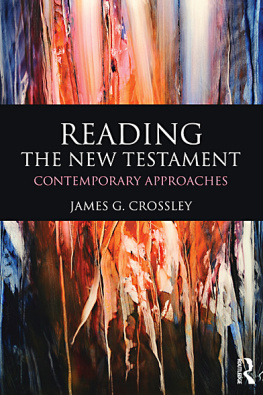Contents
Guide

Receptions of Paul in Early Christianity
Beihefte zur Zeitschrift fr die neutestamentliche Wissenschaft

Edited by
Matthias Konradt, Hermann Lichtenberger,
Judith Lieu, Laura Nasrallah,
Jens Schrter and Gregory E. Sterling
Volume 234

ISBN 978-3-11-053370-5
e-ISBN (PDF) 978-3-11-053378-1
e-ISBN (EPUB) 978-3-11-053372-9
ISSN 0171-6441
Library of Congress Cataloging-in-Publication Data
Names: Schroeter, Jens, 1961- editor.
Title: Receptions of Paul in early Christianity : the person of Paul and his writings through the eyes of his early interpreters / edited by Jens Schroeter, Simon Butticaz, Andreas Dettwiler.
Description: 1 [edition].. | Boston : De Gruyter, 2018. | Series: Beihefte zur Zeitschrift f?ur die neutestamentliche Wissenschaft ISSN 0171-6441 ; Band 234 | Includes bibliographical references and index.
Identifiers: LCCN 2018023451 (print) | LCCN 2018026001 (ebook) | ISBN 9783110533781 (electronic Portable Document Format (pdf) | ISBN 9783110533705 (print : alk. paper) | ISBN 9783110533781 (e-book pdf) | ISBN 9783110533729
(e-book epub)
Subjects: LCSH: Bible--Criticism, interpretation, etc.--History. | Paul, the Apostle, Saint. | Church history--Primitive and early church, ca. 30-600.
Classification: LCC BS2650.52 (ebook) | LCC BS2650.52 .R425 2018 (print) | DDC 227/.0609--dc23
LC record available at https://lccn.loc.gov/2018023451
Bibliografische Information der Deutschen Nationalbibliothek
Die Deutsche Nationalbibliothek verzeichnet diese Publikation in der Deutschen Nationalbibliografie; detaillierte bibliografische Daten sind im Internet ber http://dnb.dnb.de abrufbar.
2018 Walter de Gruyter GmbH, Berlin/Boston
www.degruyter.com
Preface
The idea for this volume and the two conferences on which it is based goes back to several conversations between the editors about the importance of the concept of reception for the interpretation of historical phenomena. More recently, it has been noted from different perspectives that to understand the present we must rely on history as the interpreted past, containing events that shape the self-understanding of a nation, a religious community and so forth.
Against this more general backdrop, the concept of reception has received attention of late in Christian theology, especially in biblical scholarship. It has been remarked that the emergence of Christian perspectives on history is deeply tied to founding events in the history of Israel, the interpretation of Jesus activity and fate by his early followers and in early Christian gospels as well as to the perception of the person and theology of Paul.
Discussions on this topic among the editors of this volume resulted in the plan to convene a bipartite conference on receptions of Paul in early Christianity. It was and still is our conviction that the various perspectives on Paul in the formative period of Christianity contribute substantially to our own perceptions of the person of Paul and his letters. In various historical situations interpreters highlight different aspects of Pauls theology and emphasize distinct features of his biography or his thinking. A look at the earliest interpretations of Paul in Christianity, beginning with Pauls self-perception and the interpretation of his person and work in writings that became part of the New Testament, therefore provides insight into the social constellations that characterize this early period in Christian history.
The contributors to this volume immediately and unanimously agreed to participate in the conferences, to present and discuss their views on different themes related to the overall topic and to prepare their contributions for publication. The editors wish to thank all colleagues for their enthusiasm in participating in this project and for their reliability in submitting their articles for publication.
Special thanks to Clarissa Paul (Berlin), Luc Bulundwe (Geneva), Hlne Grosjean (Lausanne), Pauline Sommer (Lausanne) and Priscille Marschall (Lausanne) for their effort in making this publication possible. We are grateful to James Kelhoffer (Uppsala) who generously offered to revise the English abstracts of non-native speakers. We want to thank the Thyssen Foundation for the generous support of the conference in Berlin and the Confrence des Universits de Suisse occidentale (CUSO) together with the Swiss National Science Foundation (SNFS) for the support of the conference in Geneva and Lausanne. The Institut romand des sciences bibliques of the University of Lausanne also provided funds for the translation and stylistic proofreading of the introduction. We are grateful for the support in the preparation and realization of the two conferences by our graduate assistants, student assistants and secretaries. Last, but not least we want to thank the publishing house Walter de Gruyter, especially Stefan Selbmann, for the support in the publication process of this volume.
Berlin, Lausanne, and Geneva, May 2018,
Jens Schrter, Simon Butticaz, and Andreas Dettwiler
I Prolegomena
Jens Schrter, Simon Butticaz and Andreas Dettwiler
The contributions in this volume are based on a bipartite conference held in Geneva and Lausanne (October 2016) and Berlin (April 2017). The aim of the conference was to provide an overview of various receptions of the person, work, and theology of the apostle Paul in early Christianity, roughly up to the end of the 2 nd century. That is also the idea behind the present volume, which contains the proceedings of the two meetings.
1 Methodological and hermeneutical considerations
From a hermeneutical perspective, the concept reception is based on the assumption that historical figures and incidents are only accessible through their remembering in texts, visual representations, rituals, and the like. In other words, there is no direct, unmediated access to historical phenomena. They are, instead, always conveyed by their presentation in various media. This general insight applies to historical, and therefore also to biblical figures such as Moses, David, Job, Jesus, Instead, it deals with the various receptions of Paul: his person, his letters, his theology, and his biography, in order to investigate how Paul became an influential, but also controversial figure in early Christianity. The term reception is thereby used in a broader sense. It not only includes explicit references to the person of Paul or quotations from his letters, but also social effects of his missionary work and implicit treatments of topics which occur in Pauls writings and were subsequently discussed in early Christian texts written under new circumstances.
The implication of such an approach is that later interpreters are always part of what Hans-Georg Gadamer has called the Wirkungsgeschichte of historical phenomena, texts, or figures. preter and the interpreted phenomenon, because the interpreter is always part of the effective history of the interpreted phenomenon. Moreover, the interpreter is influenced by the historical, political, and social situation in which he or she interprets a text, a painting, a figure from the past, etc. Receptions of Paul in history are therefore multifaceted and diverse. Ancient interpreters were interested in other aspects of the person and theology of Paul than those of the Reformation era, the liberal interpreters of the 19 th century, or the exponents of the so-called New Perspective on Paul. This does not make a historical-critical distinction between Pauls letters and their later interpretation meaningless or flawed. However, this observation implies that a focus on receptions of Paul in early Christianity will provide insights about the historical and social situation in which these receptions took place. On a hermeneutical level, such an approach alerts us, moreover, to the fact that current historical-critical interpretations are also based on particular methodological assumptions.














